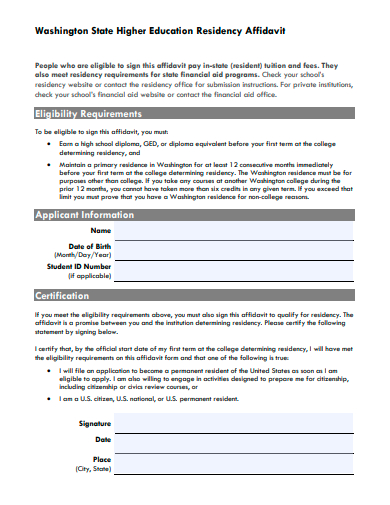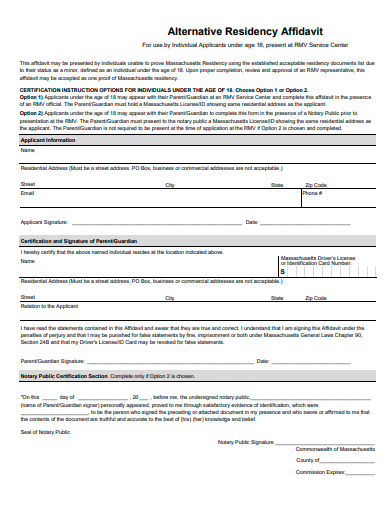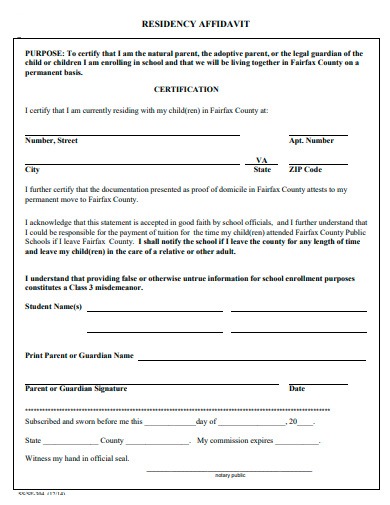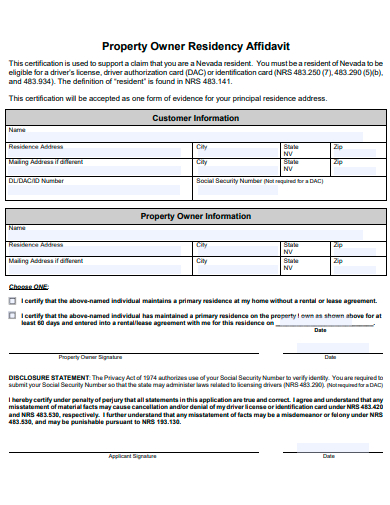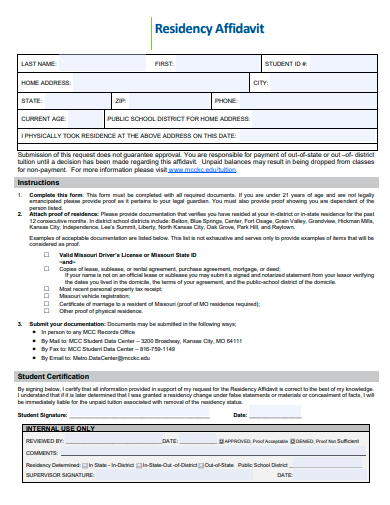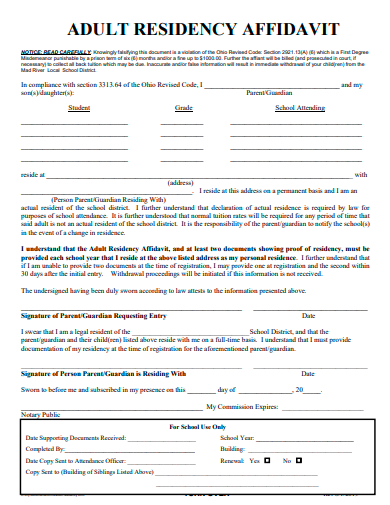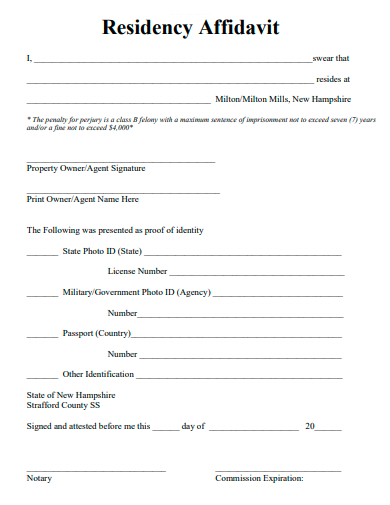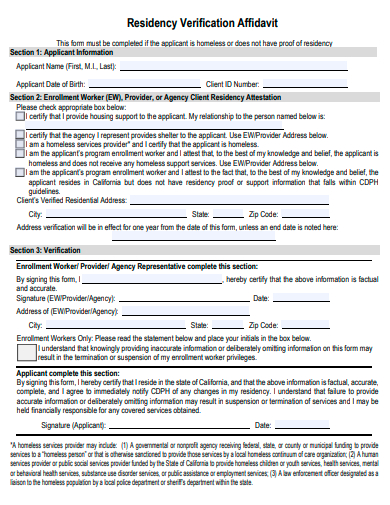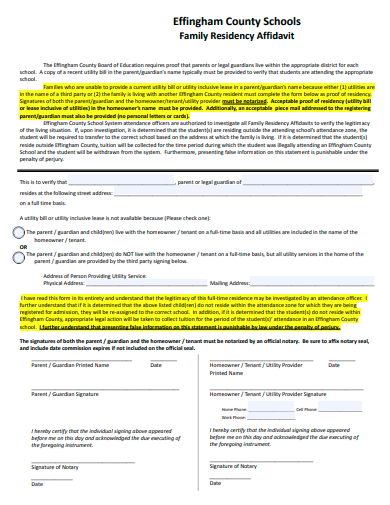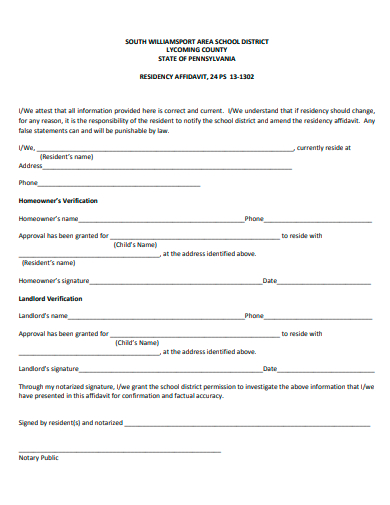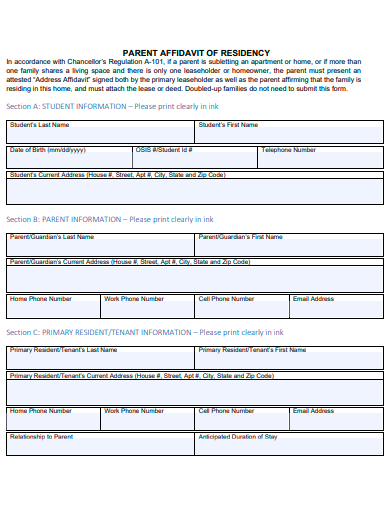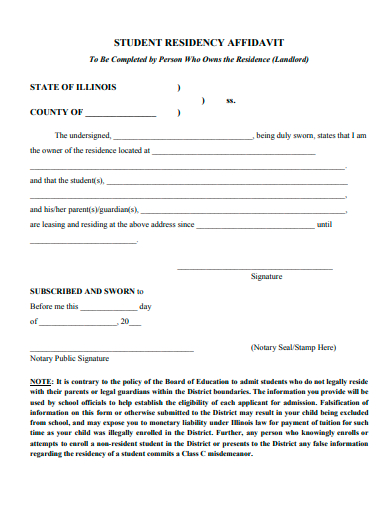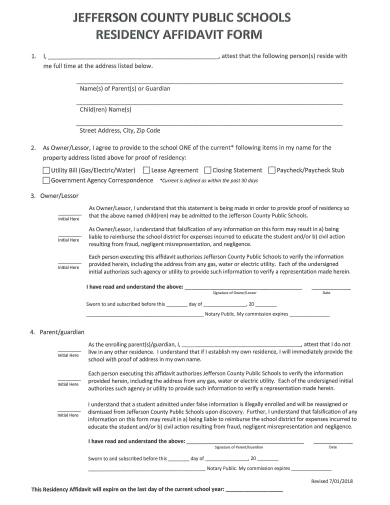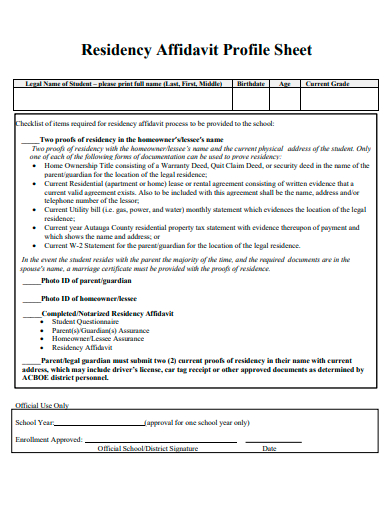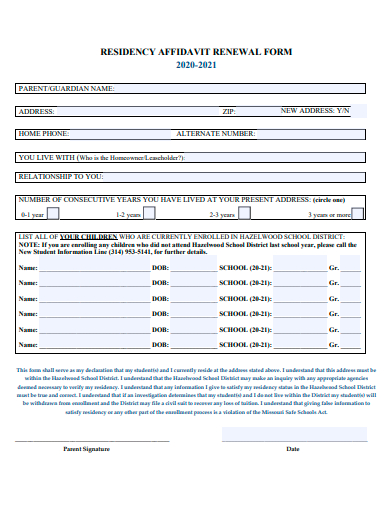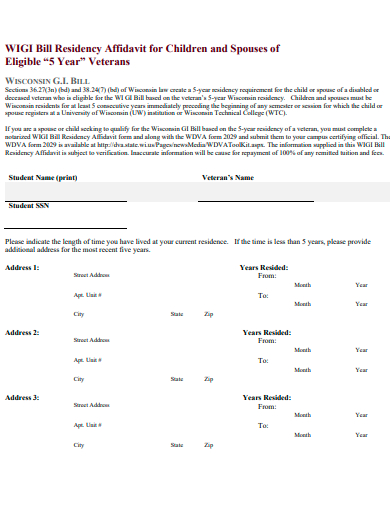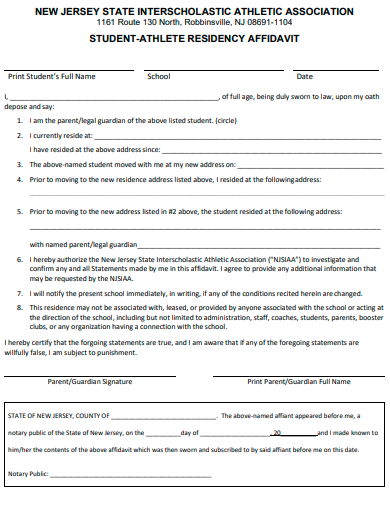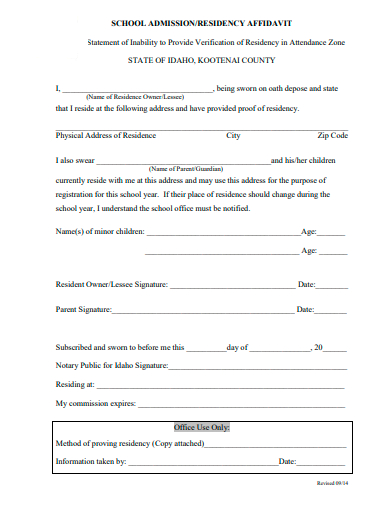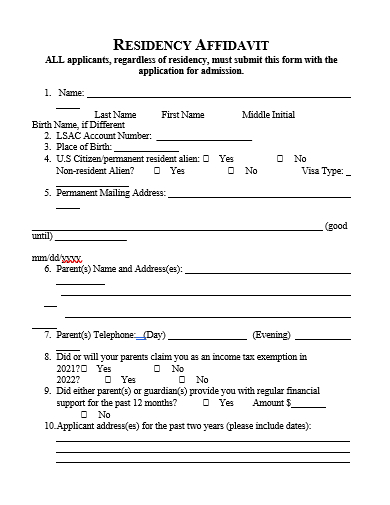Discover the efficiency and reliability of our Sample Residency Affidavit Template. When the need arises to attest to one’s residence, navigating through legal jargon can be overwhelming. However, with our Affidavit Sample, the process becomes straightforward and uncomplicated, serving as an invaluable tool for individuals seeking a hassle-free way to confirm their domicile in any official capacity.
20+ Residency Affidavit Samples
1. Residency Affidavit for College Template

2. Affidavit of Residency for School Template
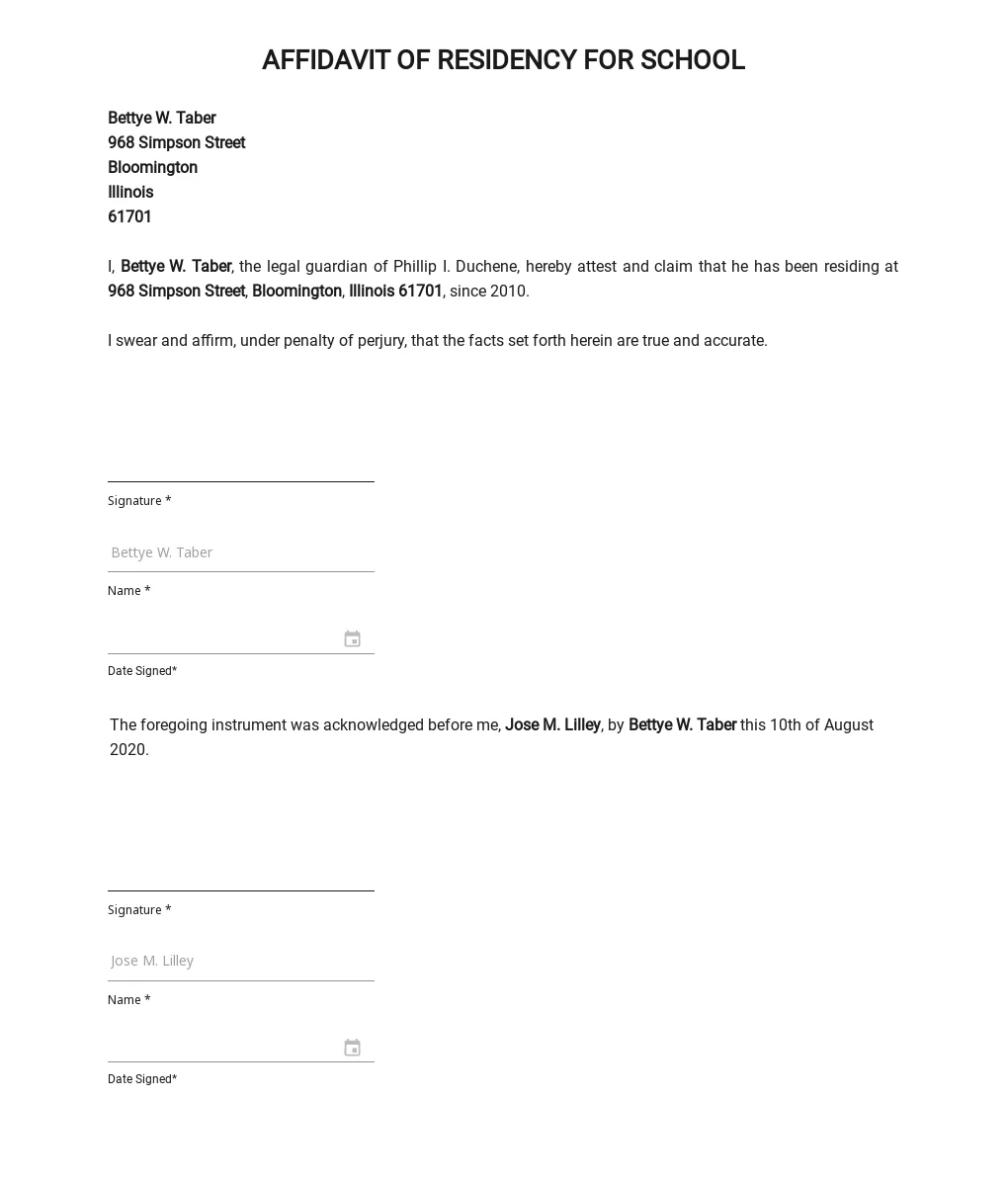
3. Higher Education Residency Affidavit Template
4. Alternative Residency Affidavit Template
5. Residency Affidavit Template
6. Property Owner Residency Affidavit Template
7. Sample Residency Affidavit Template
8. Adult Residency Affidavit Template
What is an affidavit of residence?
An affidavit of residence is a legally binding document that attests to an individual’s residence at a specified address. It serves as a declaration, under oath, confirming where someone lives, and can be used in various situations where proof of residency is required. Below we delve into its purpose, its typical components, and situations where it might be necessary.
Purpose of an Affidavit of Residence
The primary purpose of this affidavit is to provide evidence or confirmation of one’s living address. There can be several reasons why someone might need to verify their residence:
- School Enrollments: When enrolling a child in a particular school district, parents may need to prove they reside within that district’s boundaries.
- Banking and Financial Institutions: For account openings or specific financial transactions, banks might require a confirmation of address.
- Legal Proceedings: Courts or attorneys might need verification of someone’s address during legal proceedings or investigations.
- Vehicle Registrations: Departments of motor vehicles might ask for proof of residency when registering a vehicle or renewing a driver’s license.
- Voter Registrations: To register to vote in a particular precinct or district, one might need to prove they reside there.
- Typical Components of an Affidavit of Residence
Though the specifics might vary by jurisdiction or specific purpose, most affidavits of residence contain the following components:
- Declarant’s Information: This includes the name and address of the person making the declaration.
- Statement of Residence: A clear assertion that the declarant resides at the specified address.
- Duration: Details about how long the declarant has resided at that address.
- Oath or Affirmation: A statement that the information provided is accurate to the best of the
declarant’s knowledge, usually made under penalty of perjury. - Notarization: The affidavit is often notarized, meaning a notary public verifies the identity of the declarant and witnesses the signature.
- Situations Requiring an Affidavit of Residence
While we’ve already touched on some instances where this affidavit might be necessary, it’s crucial to understand that its importance often extends beyond those obvious scenarios. For instance:
- Estate Settlement: If someone passes away, their estate’s executor might need to prove the deceased’s last place of residence to settle affairs.
- Tax Purposes: Local tax authorities might require verification of residency to determine local tax obligations.
- Rental Agreements: In some cases, landlords might require an affidavit of residence from a potential tenant, especially if there are concerns about prior addresses or residency claims.
An affidavit of residence is more than just a piece of paper; it’s a critical document that can have significant ramifications in various scenarios. Whether proving one’s address to enroll a child in school or to satisfy legal requirements, it’s vital to ensure that the information provided in the affidavit is accurate and truthful. Falsifying such a document can lead to serious legal consequences, emphasizing its importance in our daily affairs.
How Do You Write a Residency Affidavit?
Drafting a residency affidavit requires a precise approach to ensure its validity and acceptance. Below is a comprehensive guide to assist you in writing an effective affidavit of residence.
Understanding the Document
A residency affidavit is a legally binding statement testifying to an individual’s residence at a specified address. Before diving into the process of writing one, it’s essential to understand its gravity. This document can be requested for various reasons, including school enrollment, voter registration, and other situations where proof of residence is required.
Step-by-Step Guide to Crafting a Residency Affidavit
1. Title and Header
Start with a clear title at the top of the page, such as “Affidavit of Residence.” Beneath this, you should state the name and address of the affiant (the person making the declaration).
2. Introduction
The opening statement should identify the affiant, usually written as: “I, [Full Name], being of legal age and sound mind, hereby declare under oath…”
3. Body of the Affidavit
Here, you’ll detail the main content of the affidavit:
Full Address: Clearly state the complete residential address, including street name, number, city, state, and postal code.
Duration of Residence: Mention how long you have resided at the given address. It could be structured as, “I have continuously resided at the aforementioned address since [Date].”
Purpose of Affidavit: If pertinent, specify the reason for providing the affidavit. For instance, “This affidavit is produced to confirm my residence for the purpose of [Reason e.g., school enrollment, voter registration].”
4. Affirmation Clause
This section reiterates the truthfulness of the declaration. It’s usually structured as: “I affirm under penalty of perjury that the foregoing statements are true and correct to the best of my knowledge and belief.”
5. Date and Signature
Conclude the affidavit with the date of writing, followed by a space for the affiant’s signature. This affirms the declaration’s credibility and time of affirmation.
6. Notary Section
For added authenticity, it’s often necessary to have the document notarized. This section is reserved for the notary public to acknowledge and authenticate the affidavit. The notary will fill out this section, which typically includes:
A statement of acknowledgment
Date of notarization
Notary’s signature
Seal of the notary
Tips and Considerations
Clarity and Accuracy: Be precise and clear in your statements, ensuring all details are accurate.
Legal Assistance: If you’re uncertain about the format or requirements, consulting with legal counsel can be beneficial. They can guide you through the process and ensure your affidavit meets jurisdictional standards.
Templates: Many online platforms, legal offices, or notary publics offer templates for affidavits of residence. These templates can be an excellent starting point, ensuring that all requisite details are included.
Creating a residency affidavit is a straightforward process, but it demands meticulous attention to detail. Always ensure the information provided is truthful and accurate, as falsifying an affidavit can have legal repercussions.
9. Basic Residency Affidavit Template
10. Residency Verification Affidavit Template
11. Sample Family Residency Affidavit Template
12. Residency Affidavit in PDF
13. Sample Parent Affidavit of Residency Template
14. Student Residency Affidavit Template
15. Residency Affidavit Form Template
16. Sample Residency Affidavit Profile Sheet Template
17. Residency Affidavit Renewal Form Template
18. Bill Residency Affidavit Template
19. Sample Student Athlete Residency Affidavit Template
20. School Admission Residency Affidavit Template
21. Residency Affidavit in DOC
How Do You Prove Residency If You Live With Someone?
Establishing proof of residency can be straightforward if you have bills or official documents in your name addressed to your residence. However, if you live with someone else and don’t have such documentation, the process can be slightly more complex. Here’s a comprehensive guide to help you prove your residency when living with someone else:
Affidavit of Residency:
The person you live with can provide a signed, notarized statement confirming that you reside with them. This statement, commonly known as an affidavit of residency, details your relationship with the person (e.g., friend, relative) and verifies that you live at the address in question.
Personal Mail:
Even if you don’t have bills in your name, other types of mail can serve as proof. Any official communication, such as letters from banks, educational institutions, or governmental agencies, can be used. Ensure the postmark date is visible to show recent correspondence.
Evidence of Relationship:
Some institutions may require additional proof of your relationship with the person you live with. This could be a birth certificate (proving a parent-child relationship), marriage certificate, or other relevant documentation.
Additional Documents from the Homeowner/Renter:
Showing documents that tie the person you’re living with to the residence can also help. This might include their lease agreement, utility bills, or property tax statements. When combined with the affidavit, these documents can bolster your residency claim.
Receipts or Agreements:
If you contribute to household expenses, keep receipts or have a written agreement detailing your contributions. This can be in the form of rent receipts, utility bills you’ve paid, or other household-related expenses.
Employment or School Verification:
A letter from your employer or school, on official letterhead, which states your address can serve as a form of residency proof. This letter should ideally contain details about the duration of your employment or enrollment and confirm your residential address.
Voter Registration or DMV Records:
If you’re registered to vote at your current address or have a driver’s license or ID card with the address, these documents can be presented as proof of residency.
Medical Records or Statements:
A statement from a doctor or any medical records showing your address can also be used. Ensure the documents come from reputable institutions or practitioners.
Other Members of the Community:
In some situations, testimonies or letters from neighbors or community members familiar with you and your living situation can be supportive, although this might not be as strong as other types of documentation.
Tips and Considerations:
Multiple Documents: It’s often beneficial to provide more than one type of proof. The combination of documents can present a stronger case for your residency.
Update Your Address: Where possible, ensure you update your address for bank accounts, governmental agencies, and other institutions. Over time, this will increase the number of documents available to you that prove residency.
Stay Informed: Residency requirements can vary based on the institution or reason for verification. Always check specific requirements for the situation at hand.
While proving residency when living with someone else can seem daunting, several avenues are available to establish your domicile. Always ensure that documents are current and, where possible, corroborate your claim with multiple types of evidence.
When is an Affidavit of Residency Required?
An affidavit of residency is a sworn statement that certifies an individual’s residence at a specific address. This legally binding document, usually notarized to validate its authenticity, is employed in various situations where formal proof of an individual’s residence is essential. The following guide delves into instances where an affidavit of residency might be required:
Education and School Enrollments:
One of the most common uses of an affidavit of residency is during school registrations. Schools and educational institutions often require proof that a student lives within the school district’s boundaries. This ensures that the student is eligible for enrollment in that particular school or district. Parents or guardians might need to provide an affidavit to confirm the student’s address, especially if other standard proof-of-residency documents are not available.
Vehicle Registrations and Driver’s Licensing:
The Department of Motor Vehicles (DMV) or similar institutions in various regions may demand proof of residency when an individual applies for a driver’s license, renews a license, or registers a vehicle. An affidavit can serve this purpose, especially when primary residency proofs like utility bills or lease agreements are not in the individual’s name.
Voter Registration:
To ensure individuals vote in the appropriate precincts or districts, voter registration processes may necessitate proof of residence. An affidavit of residency can help establish the individual’s correct voting district if standard documents aren’t readily available.
Legal Proceedings and Court Matters:
During specific legal actions, court procedures, or investigations, the involved parties might need to provide evidence of their address. The affidavit acts as a reliable document in such situations, certifying the individual’s claimed residence.
Opening Bank Accounts:
Some financial institutions might require more than just an individual’s word when opening a bank account. They may ask for an affidavit of residency to ensure they have accurate, verified details about the account holder’s domicile.
Estate and Probate Processes:
Upon the death of an individual, determining their last place of residence can be crucial for probate and estate settlement procedures. An affidavit might be needed to confirm the deceased’s residency, especially in complex situations where multiple properties or states are involved.
Rental and Housing Situations:
If someone lives with another party and does not have traditional residency documents in their name (like utility bills or rental agreements), a landlord or housing agency might request an affidavit of residency. This document, typically signed by the primary leaseholder or homeowner, confirms that the individual resides at the specified address.
Benefit Claims:
For individuals applying for certain local or state benefits, including welfare or other social services, providing proof of residency ensures they receive services applicable to their jurisdiction.
The affidavit of residency is a versatile document that finds utility in a wide range of scenarios. Its primary function is to establish trust and provide verification of an individual’s residence when other forms of documentation might be absent or insufficient. Given its legal weight, it’s crucial to ensure the accuracy and truthfulness of the information presented in the affidavit, as any false declarations can have serious legal ramifications.
Related Posts
Retirement Speech Samples & Templates
Weekly Schedule Samples & Templates
Contractual Agreement Samples & Templates
FREE 9+ Amazing Sample Church Bulletin Templates in PSD | PDF
Sample Business Card Templates
Sample Cashier Job Descriptions
Questionnaire Samples
FREE 10+ Sample HR Resource Templates in PDF
FREE 49+ Sample Job Descriptions in PDF | MS Word
FREE 23+ Sample Event Calendar Templates in PDF | MS Word | Google Docs | Apple Pages
Company Profile Samples
FREE 10+ Leadership Report Samples [ Development, Training, Camp ]
FREE 24+ Sample Payment Schedules in PDF | MS Word
FREE 10+ Return to Work Action Plan Samples in PDF | DOC
Autobiography Samples & Templates

